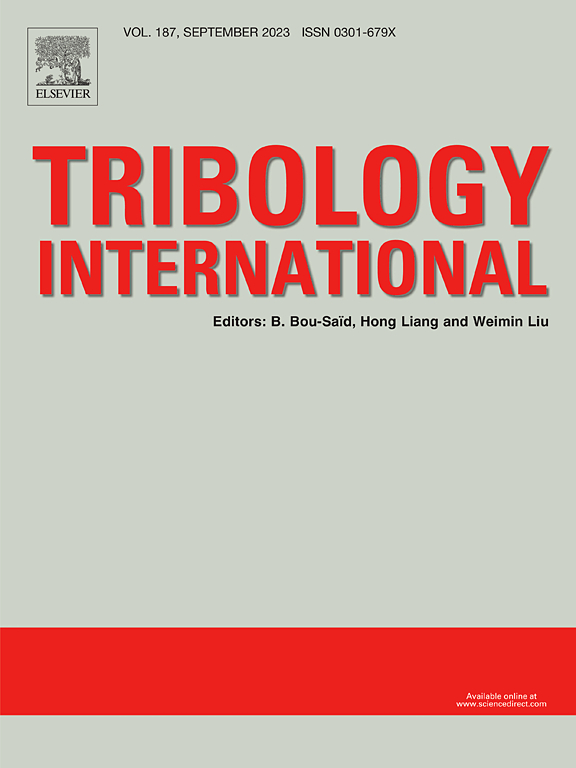Effect of temperature on tribological behavior of L–proline–based green deep eutectic solvents for Ti6Al4V interfaces: A study of novel potential lubricant
IF 6.1
1区 工程技术
Q1 ENGINEERING, MECHANICAL
引用次数: 0
Abstract
This study aims to develop a novel, eco-friendly lubricant engineered to meet antiwear requirements, reduce energy consumption, and improve performance reliability. A series of deep eutectic solvents (DESs) was successfully synthesized using a facile, one-step approach by combining eco-friendly L-Proline with diols and two distinct carboxylic acids as hydrogen bond donors. The resulting DES lubricants exhibit favourable physicochemical properties and excellent lubrication performance. Notably, the L-Proline /Oxalic acid DES demonstrates superior lubrication performance, resulting in a substantial decrease in both friction (∼46–78 %) and wear volume (∼61–91 %) compared to PEG 200 and choline chloride/urea across all tested temperatures. Furthermore, in-depth analysis of the worn surfaces reveals the formation of a tribo-chemical film derived from L-Proline based DESs, consisting of hydrocarbon (CxHy), oxy metal nitride (Ti-N-O) fragments, along with titanium oxide/hydroxide-rich layer. This film plays a vital role in delivering effective lubrication for titanium alloy surfaces. These findings pave the way for designing eco-friendly, high-performance lubricants for sustainable lubrication practices.
温度对l -脯氨酸基Ti6Al4V界面绿色深共晶溶剂摩擦学行为的影响:一种新型潜在润滑剂的研究
本研究旨在开发一种新型的环保润滑剂,以满足抗磨要求,降低能耗,提高性能可靠性。通过将环保的l -脯氨酸与二醇和两种不同的羧酸作为氢键给体结合,成功地一步合成了一系列深度共晶溶剂(DESs)。所制得的DES润滑油具有良好的物理化学性能和优良的润滑性能。值得注意的是,l -脯氨酸/草酸DES表现出卓越的润滑性能,与PEG 200和氯化胆碱/尿素相比,在所有测试温度下,摩擦(~ 46-78 %)和磨损量(~ 61-91 %)都大幅降低。此外,对磨损表面的深入分析表明,l -脯氨酸基DESs形成了一层摩擦化学膜,由碳氢化合物(CxHy)、含氧金属氮化物(Ti-N-O)碎片以及富含氧化钛/氢氧化物的层组成。这种薄膜在为钛合金表面提供有效润滑方面起着至关重要的作用。这些发现为设计可持续润滑实践的环保、高性能润滑剂铺平了道路。
本文章由计算机程序翻译,如有差异,请以英文原文为准。
求助全文
约1分钟内获得全文
求助全文
来源期刊

Tribology International
工程技术-工程:机械
CiteScore
10.10
自引率
16.10%
发文量
627
审稿时长
35 days
期刊介绍:
Tribology is the science of rubbing surfaces and contributes to every facet of our everyday life, from live cell friction to engine lubrication and seismology. As such tribology is truly multidisciplinary and this extraordinary breadth of scientific interest is reflected in the scope of Tribology International.
Tribology International seeks to publish original research papers of the highest scientific quality to provide an archival resource for scientists from all backgrounds. Written contributions are invited reporting experimental and modelling studies both in established areas of tribology and emerging fields. Scientific topics include the physics or chemistry of tribo-surfaces, bio-tribology, surface engineering and materials, contact mechanics, nano-tribology, lubricants and hydrodynamic lubrication.
 求助内容:
求助内容: 应助结果提醒方式:
应助结果提醒方式:


